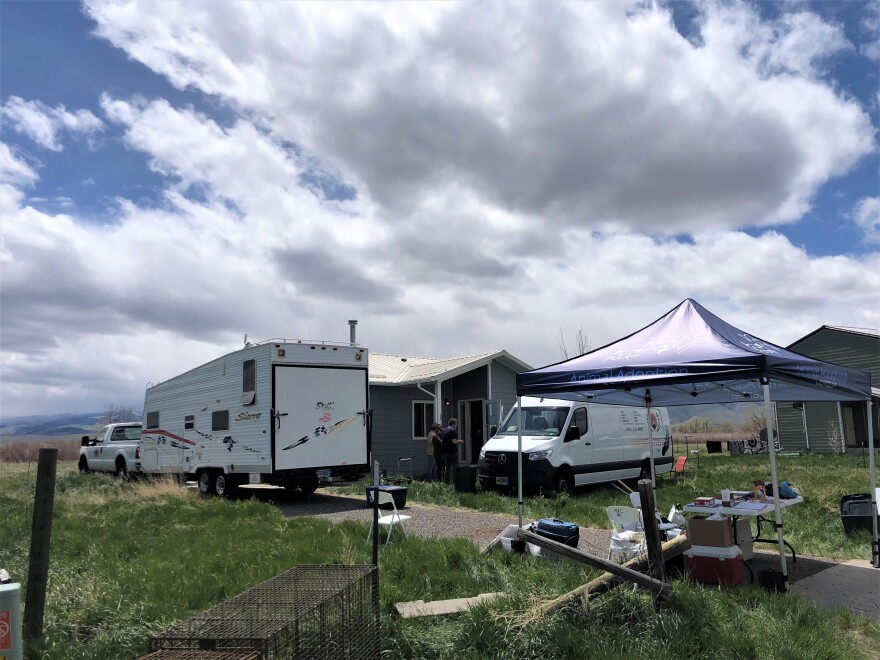The family of Sharon Bell surrounded her as she talked about her daughter. Shawna Jo Bell passed away in Ethete on April 10.
Sharon suffered a stroke last year and her daughter, Shawna, was providing home care.
"She stayed with me. Helping me with my food and necessities. But she was right by my side… she was always here. And now she isn't," Sharon said with tears in her eyes.
There is a lot of confusion surrounding Shawna's death and while Sharon was promised weekly updates by law enforcement, none came. As of this publication, she has not been updated on her daughter's case.

"I'm really quite pi**** off because it seems like nobody's isn't doing anything," she said as she placed her closed fist on the table in front of her.
But Sharon has spoken with the coroner. Although the coroner's report hasn't been released yet, Sharon said the coroner did have this to say.
"He said 'But I can tell you this: she was alive when the dog [was] chewing on her.' And that's all he said," Sharon said.
Family members say that Shawna rode her bike everywhere and that she kept a hatchet on herself to protect herself from feral dogs.
Most residents outside a vehicle do carry something to protect themselves from dogs. That's because they are out of control. They run wild and threaten community members.
The Wind River Reservation does not have animal control and law enforcement can only do so much without a dog ordinance to back them up. Getting one on the reservation would make it easier to control the growing dog population.
A mobile solution
On a Saturday afternoon, an RV and a van are parked outside a residential home. Used as mobile COVID testing vehicles, they now have been repurposed for a different type of public health emergency.
Lani Hamilton has been a vet for 30 years, the last 10 of those years on the Wind River Reservation. She's helping out at the first mobile spay and neuter clinic put on by the Animal Adoption Center in Fort Washakie.
"We came up with this idea of having neighborhood clinics where we park in the neighborhood and try to get all the dogs in the neighborhood fixed," she said, tired yet smiling.

Because there are no regulations, fixing dogs is the one solution available at the moment. And Hamilton and many other vets provide free fixing services for pets. While the pandemic did close down the big clinics they set up around four times a year, Hamilton said she and another vet were still advertising free spay and neutering.
"I'd go do, I don't know, 10 surgeries a week. And at 50 weeks, that's 500 surgeries, I didn't do 500 surgeries. But between the two of us, we probably did. And we only do 300 a year with the big clinics," she said.
So, even though in the past couple of years, more and more dogs have gotten fixed, Hamilton said the problem seems to just be getting worse.
"That's why I say I think there's thousands. Because I don't think we've made any impact with all that work. And we haven't changed a thing, which is really hard to accept," she said.
Hamilton said that Riverton's animal shelter is overwhelmed, and Lander doesn't have a shelter, only a local rescue.
The Animal Adoption Center from Jackson has been helping vaccinate, spay and neuter pets on the Wind River Reservation since 2012. During this neighborhood clinic, they treated around 50 pets in Fort Washakie. The Animal Adoption Center in May alone spayed and neutered 300 animals and administered 750 vaccinations in conjunction with tribal entities.
The Eastern Shoshone Housing Authority and the Eastern Shoshone Tribal Health work with Animal Adoption Center to get the word out, assist with animal transport, and provide vehicles to do surgeries in. Indian Health Services provides help with rabies vaccinations.
Tom Logan was at the first mobile clinic as well. He's the head of security for Eastern Shoshone housing, which does have regulations surrounding dogs. Anyone who lives in tribal housing must adhere to rules regarding pets, but wandering dogs are the problem, not so much house pets. When people living in tribal housing need help, they call him.
"It's kind of increased lately, that there's a lot of dogs up, you know, chasing kids trying to bite them. They'll be getting off the school bus or getting on and dogs would be out there, nipping at them and scaring them," he said.
Logan said that he gets two dog-related calls a week, but there is only so much he can do.
"Pretty much, nothing else to do but you know, run them off. And just try to be around when the buses are dropping the kids off or picking them up and make sure they are not chasing them," he said.
Logan said community members carry pipes and big sticks with them to protect themselves and it's just a matter of time before another incident like Shawna Jo happens again.
Update on Ordinance
The Northern Arapaho has already approved the dog ordinance and not much has changed since last year. The way the law works is that it has to be approved by both tribal councils.
Eastern Shoshone Indian Health Service director Dave Meyers said in an email to Wyoming Public Radio that the ordinance needs to be presented to the general council again to incorporate it into the law and order code. Currently, when that will happen has not been made public.
Until the ordinance is presented to the council, the dog problem will continue to grow.









